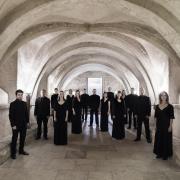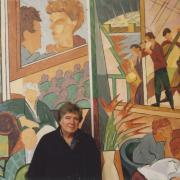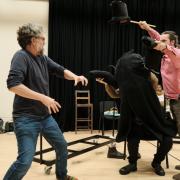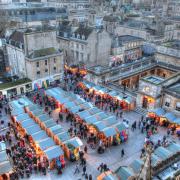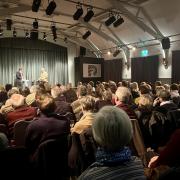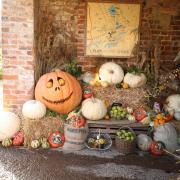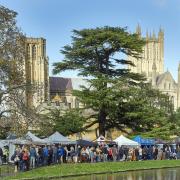Words: Chris Allsop
The ‘unputdownable’ Bristol Festival of Literature (not, you understand, a ‘Literary Festival’ nor a ‘WordFest’) lands 19-27 October with literary events aplenty scattered throughout the city.
The distinction in the names may seem pedantic, but it’s a significant issue for an event only in its third yea, intent on carving out a distinctive niche in the crowded South West lit-fest calendar. And it’s been a learning process, as festival director Jari Moate describes.
“The event has been operating purely on volunteer power and sponsorship from local firms,” says Moate. “We started out with 56 events in 2011, learned some lessons, and tightened it up. This year we’ve got 36 events, and, again, about 40 writers. And we try to be as inventive as we possibly can.”
With an overarching theme of ‘survivors’ bringing together an eclectic and engaging programme, big names to look out for this year include Bravo Two Zero thriller maestro, Andy McNab; Alison Moore, Man Booker-shortlisted author of The Lighthouse; children’s fiction titan, Michael Morpurgo; as well as Orange Prize winner and local literary luminary, Helen Dunmore.
But what differentiates the Bristol event is that it isn’t obsessed with big names seeking a platform from which to promote their latest offering—the format of so many literary festivals. As Moate says in the introduction to the programme, ‘we love to do things differently. We bring you brilliant writers whom you may not meet elsewhere and showcase the creative word, often in surprising places’.
Surprising places? Such as? Try the ‘urban caves’ at Redcliffe Wharf, where a number of events will be hosted this year. Not sure whether literary cave-dwelling is your pace?
The programme, as in previous years, is helpfully colour-coded into five categories to simplify your decision-making process: Be Inspired; Grassroots Highs (Moate is partial to punning); Think Write; Family Sized; and Performance.
Be Inspired includes such things as the 2013 Bristol Short Story Prize Award Ceremony held at the Arnolfini, as well as events like The Rum Readings with author Jasper Gibson reading from his novel, A Bright Moon for Fools, at The Parlour.
Grassroots Highs celebrates local writing, and to this end you can attend events such as that hosted by the Bristol Women Writers Group and Tania Hershman celebrating Unchained—a collection of fiction and poetry inspired by the Bristol library service’s 400th anniversary.
The category Think Write involves an emphasis on the writing process and the exploration of ideas. The jewel in the crown here is the Bristol Writers’ Conference: a three-part event taking place over the course of one evening and involving tips for writers on characterisation; a session workshopping pre-submitted audience work; and a final juicy third involving author Alison Moore in conversation with the National Academy of Writing’s Richard Beard.
Family Sized offers up happenings suitable for the whole family, and this includes the schools programme (14–18 October) running in the lead-up to the festival that will feature Morpurgo and Charlie and Lola author Lauren Child.
During the festival proper, other Family Sized events include the rather intimidating sounding ‘Squash and Pop’, described as “family time with an edge” where kids take on adults at a poetry-making contest.
Finally, the Performance category seems straightforward, but again you’ll find the events tinged with the originality that permeates the entire schedule. The caves play host to writer and poet Owen Sheers who will be performing his verse-drama, Pink Mist, to a trip hop soundtrack, while the following night the waterside location will act as a stage for a performance of crime fiction by professional actors.
Unputdownable? More like unmissable.
Check out the programme at: unputdownable.org
The tale of Thomas Chatterton
It might come as a surprise to many that in Bristol—noted for its vibrant artistic scene and England’s sixth largest city by population—there has only been an established literary festival since the first instalment of Unputdownable: The Bristol Festival of Literature in 2011.
However, the subdued profile of the city’s literary heritage seems appropriate, almost in keeping with the way that the creative has mimicked its practical operations as a port, with Bristol a point of departure or inspiration for works such as Treasure Island, Robinson Crusoe and Wordsworth’s Tintern Abbey.
Perhaps emblematic of Bristol’s literary heritage is the extraordinary story of Thomas Chatterton. Chatterton came to public notice on the occasion of the opening of the new Bristol Bridge in 1768, when he produced an apparently authentic medieval report of the opening of the original Bristol Bridge some five hundred years earlier.
The 16-year old Chatterton claimed to have discovered the precious document, along with some medieval poetry, in suitably Gothic style: amid a pile of ancient manuscripts dug out of an inherited chest. The poetry, attributed to a ‘Dunhelmus Bristoliensuis’, was an entirely convincing piece of thirteenth-century verse (and which also carried a reference to the original Bristol Bridge):
Now agayne with bremie Force,
Severn in his auntient Course,
Rolls his rappyd streeme alonge,
With a Sable, swift and stronge
Movynge manie a okie wode –
We, the Menne of Brystowe towne,
Have yreed this Brydge of Stone;
Further poetic masterworks emerged from the miraculous chest, this time penned by a fifteenth-century monk named Thomas Rowley. Except, of course, it wasn’t the chest but Chatterton who was producing the poetry—a series of remarkable forgeries by a precocious talent. Chatterton fled to London before his deception could be uncovered. Two years later, penniless and depressed, he took his own life after attempts to ignite a creative career in the capital had floundered.
But what Chatterton failed to secure in life, he achieved vicariously in death, acting as an inspiration for poets such as Wordsworth, Coleridge and Southey. To the extent that Wordsworth, as historian Peter Aughton writes in ‘Bristol: A People’s History’, described him as ‘…the first of the romantic poets’.
Check out the programme at
unputdownable.org








